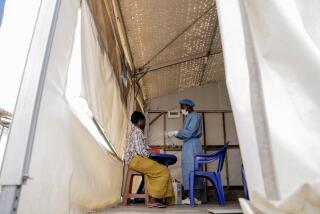Hope Amid Terror
- Share via
The shooting stopped for a third Sunday this week in El Salvador--an undeclared armistice for soldiers and guerrillas while 20,000 public health workers and volunteers, armed only with vaccine for more than 200,000 children, were deployed throughout the country.
El Salvador became the first nation at war to enroll in the global campaign to halt the lethal effects of diphtheria, whooping cough, tetanus, measles and polio, which each year claim the lives of more than 4 million children. International organizations, led by the United Nations Children’s Fund and the World Health Organization, are committed to eradicating that terrible toll by 1990.
“We are not being utopian or unrealistic to think that the goal can be reached,” Dr. Stephen Joseph told us after the success of the operation in El Salvador. He is special coordinator for child health and survival at UNICEF headquarters in New York.
Colombia was the first nation to make a national commitment to universal vaccination. In three years it increased vaccination protection from 40% to more than 80% of the vulnerable children. Now a dozen nations are committed to major campaigns in the next 18 months. And UNICEF, the world’s largest supplier of vaccine, has seen its distribution double in two years to a total of 275 million vaccines last year, according to Joseph.
Two-thirds of the deaths that can be prevented by vaccination occur in five nations--India, Pakistan, Bangladesh, Indonesia and Nigeria. Those are priority targets. But it is not easy. Effective protection requires three injections for each child for diphtheria, tetanus and whooping cough, three doses of oral polio vaccine and one measles shot. In El Salvador the war was suspended on the first Sunday of three consecutive months, commencing Feb. 3, to permit public health teams to set up vaccine stations, even in troubled areas. No precise count is yet available of how many received all necessary shots, but a majority of the 400,000 children are known to have been vaccinated. That alone will make a difference, for these diseases account for 60% of the child deaths in the nation.
“The evidence suggests that these special national campaigns can be built on to establish sustained vaccination programs,” Joseph reported.
Essentially, that means lifetime protection. The protection may be improved by booster shots for tetanus, and newborns as well as mothers can be protected even more effectively from the ravages of tetanus if two additional tetanus shots are administered during pregnancy. But the basic three-time vaccination program is the key.
UNICEF estimates that at least 25% of the world’s children already have received this protection. “We’re really on the way,” Joseph said. Those are words of hope, even amid the terror of the guerrilla warfare in El Salvador.
More to Read
Sign up for Essential California
The most important California stories and recommendations in your inbox every morning.
You may occasionally receive promotional content from the Los Angeles Times.













